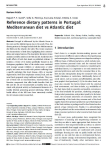Guiné R.P.F., Florença S.G., Amaral A.L., Costa C.A. (2025). Reference dietary patterns in Portugal: Mediterranean diet vs Atlantic diet. Open Agriculture, 01/01/2025, vol. 10, n. 1, p. 1-13.
https://doi.org/10.1515/opag-2022-0406
https://doi.org/10.1515/opag-2022-0406
| Titre : | Reference dietary patterns in Portugal: Mediterranean diet vs Atlantic diet (2025) |
| Auteurs : | R.P.F. Guiné ; S.G. Florença ; A.L. Amaral ; C.A. Costa |
| Type de document : | Article |
| Dans : | Open Agriculture (vol. 10, n. 1, Janvier 2025) |
| Article en page(s) : | p. 1-13 |
| Langues : | Anglais |
| Langues du résumé : | Anglais |
| Catégories : |
Catégories principales 08 - ALIMENTATION ; 8.2 - Nutrition. Alimentation Humaine. SantéThésaurus IAMM REGIME ALIMENTAIRE ; DIETE MEDITERRANEENNE ; PRATIQUE ALIMENTAIRE ; COMPORTEMENT ALIMENTAIRE ; SANTE ; PORTUGAL |
| Résumé : | Portugal is influenced by the Atlantic Ocean to the west and the Mediterranean Sea to the south. Thus, the dietary patterns in Portugal include both the Mediterranean diet (MD) and the Atlantic diet (AD). This review examines the characteristics of both diets, highlighting their commonalities and unique features. This descriptive literature review analyses scientific articles on the MD and AD. It addresses the health effects of both diets based on published evidence. It includes a review of 15 studies specifically focused on the Portuguese population. Most of the studies were conducted with younger people (children or adolescents) or older people, and some were made with patients suffering from a specific pathology, like heart disease, AIDS, or macular degeneration. Both diets emphasize natural, local, and seasonal foods prepared using traditional methods. They consist of foods rich in macronutrients, micronutrients, and bioactive compounds that offer health benefits. Both the MD and the AD are recommended as healthy diets, associated with physical activity as fundamental elements of a healthy lifestyle promoting general well-being. While the health effects of the MD have been extensively studied, the AD remains under-researched. |
| Cote : | En ligne |
| URL / DOI : | https://doi.org/10.1515/opag-2022-0406 |







